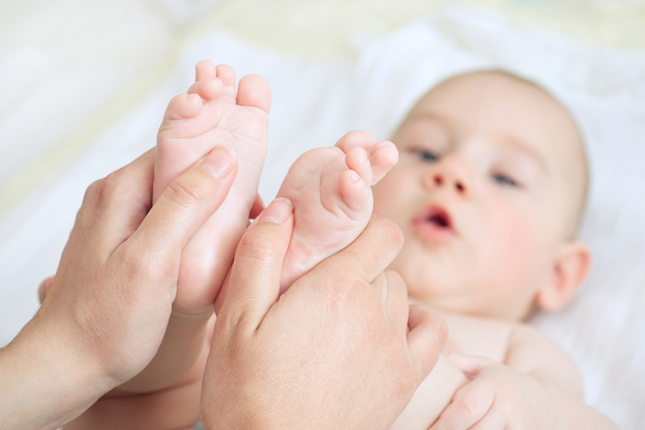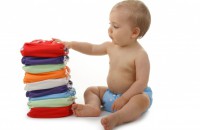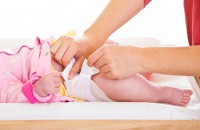Parent Savers
Elimination Communication: Going Diaperless!
Episode 56, May 29th, 2013
Please be advised, this transcription was performed from a company independent of New Mommy Media, LLC. As such, translation was required which may alter the accuracy of the transcription.
[00:00:00]
[Theme Music]
Elizabeth Stevens : For many parents of newborns, the decision of which diaper to use is often cast as an either/or proposition: disposable or cloth. But what if I told you there was a third choice? One that nearly half the world uses? For Western cultures, this process of mostly diaper-free infancy has been given the name “elimination communication”, and it starts the process of teaching your babies to use the toilet from the time they are born. I'm Elizabeth Stevens, and today we're talking all about elimination communication.
[Theme Music/Intro]
Johner Riehl : Welcome everybody to Parent Savers, once again, we're broadcasting from the Birth Education Center of San Diego, such a lovely place, thanks so much to them for letting us use it. Parent Savers is your weekly online support group for parents of newborns, infants and toddlers. I'm your host, Johner Riehl, thanks again for all our loyal listeners who joined the Parent Savers Club. Our subscribers get all our archived episodes, bonus content after each new show, plus special giveaways and discounts. So you can also subscribe for our monthly Parent Savers newsletter for free, for a chance to win a membership to our club each month. Another way for you to stay connected is by downloading our free Parent Savers app, available in the iTunes marketplace, it's free to download and then every week, when a new episode is published, you will get notifications. You can also download Boob Group app, as well as a Preggie Palls app. I think you guys all know by now, but my name is Johner and I have three boys, a 6-year-old, a 4-year-old and a 2-year-old. I'm also joined here in the studio by a couple of other panelists.
Sunny Gault : Hey everyone, I'm Sunny Gault, and I am the host of Parent Savers sister show, Preggie Palls, which is all about pregnancy. I am pregnant right now with our third, we don't know what we're having yet, we're due in December, and we also have two little boys at home, an almost 3-year-old and a little boy that just turned 1. So it's going to be a full house!
Laurie Babb : And I'm Laurie, Laurie Babb, and I am a mother of two boys, 2 and a half and 5, and I'm also a small business owner in San Diego.
Johner Riehl : From the panelists perspective, we got the boys covered. But Elizabeth, how about you?
Elizabeth Stevens : I'm the mother of four children, I have a son who's 16 and I have three girls that are 9, 7 and 6, and they're 18 months apart.
Sunny Gault : Wow! You were busy for a while
Elizabeth Stevens : I was very busy.
Johner Riehl : She still is, but she's different kind of busy.
Elizabeth Stevens : Yeah.
[Theme Music]
Johner Riehl : Here's a question from one of our listeners, Hatty, from New Mexico, asks us, “Hi, I'm a first time mom with a one week old newborn. Is it possible for an infant this young to develop diaper rash? Even if I use ointment with every change to prevent diaper rash? What should I do if my daughter continues to get diaper rash?”
Tara Zandvliet : Hello Hatty, this is Dr. Tara Zandvliet. Yes, it is definitely possible for your newborn to have a diaper rash in the first week. It's often the time they get the most diaper rashes. Their newborn skin is supersensitive, and everything from the diaper, the cream, the wipes, and even their own urine can irritate the skin to the point that it seems like a burn. As they get older, their skin becomes much less sensitive and diaper rash happens less often. So keep the skin clean and dry, change the diaper often, and don't rub a lot with those wipes. It's hard with at the beginning, but by now it should be easy to gently wipe off the stool. Consider using just a soft cloth with water instead of a wipe, or use hypoallergenic wipes with aloe, you can use aloe creams, zinc creams like Desitin, or vitamine creams like A&D, they all help as a barrier between the wetness and the skin. If you use a zinc cream, use the original ones, not the creamier. One favorite where I trained was called Happy Heiny, which was a mixture of a zinc cream, an antifungal women's vaginal cream, like Monistat, and an anti-itch cream which was hydroxychromone 1%, and it was the ointment, not the cream. And we mixed that up, in equal parts, and put it on in each diaper change, and it worked like a charm. If you continue having problems, than consider changing the diaper brand, even if they're cloth. I hope that helps.
[Theme Music]
Johner Riehl : Today's topic is elimination communication, and it's one that many of our listeners have requested, we actually had a specific request from a listener on our hot-line.
Sunny Gault : Yeah, actually Ann, from Charlotte, North Carolina, gave us a call, and she left this message.
Ann Bates : Hi there! This is Ann Bates, calling from Charlotte, North Carolina. I am a dedicated listener to all of your different segments, Preggie Palls, the Boob Group, Parent Savers; I love the episodes that you guys have. I wanted to see if you guys can do an episode in any of your segments on elimination communication, also known as natural infant hygiene, or infant potty training. This has kind of come in to my party recently and it has been an interesting journey for myself and my five and a half months old. Just kind of wanted to get the word out and also read a little bit more about it and hear a little bit more about it. So, anyway, I hope you all have a great day and thanks for listening to my message. Bye!
Sunny Gault : Well, thank you, Ann, I love hearing listeners when they call, 'cause, you know, sometimes we get emails and stuff like that, but I love that you called, Ann, that's fantastic! Thank you!
Johner Riehl : We've also seen a couple of tweets about it too and I know from just talking to some people, it's something that a lot of people have asked me about. So I'm really excited to be joined by Elizabeth Stevens, who is a mom of four, and she's gone through this, at least with some of her kids, if not all of them. So welcome!
Elizabeth Stevens : Thank you! Yeah, I've gone through with at least three of them.
Johner Riehl : So let's start. What is Elimination Communication?
Elizabeth Stevens : Elimination Communication is just basically, from the time your children are little, taking them to the appropriate place to potty instead of waiting until they're older or old enough, or whatever that means, to traditionally potty train them.
Johner Riehl : Right, so certainly everything that I feel like I've learned or experienced as a dad is, Sunny Gault : “Oh yeah, kids aren't even ready for that until three or four years old”.
Elizabeth Stevens : Right.
Johner Riehl : So this is a fascinating idea and one that I think is meat with some fears that, “Oh my gush! What a mess it's going to make”
Sunny Gault : What a mess, what a headache, it's going to take more time, you're going to be swimming in poop and pee...
Johner Riehl : So tell me now about your experience.
Elizabeth Stevens : Well, I found out about it originally when my daughter was 6 weeks old. And with my son, I didn't have any clue about it. I was about 19 when I had my son and I just did what, you know, you find pamphlets from the doctor's office and they say this is what's appropriate for this age, and I had no idea. But what I did do with my son is I use to stick him on the toilet on a little potty insert, because I didn't want him to be afraid of the toilet, and I thought, I heard all these things about, “Oh, you know, when you start potty training, they might be afraid of the toilet”. So I thought, well, I'll just stick him on there so he's comfortable with it, and that way he won't ever be afraid of the toilet, I won't have that issue. But I didn't lock in to catch any pee with him, so. Anyhow, I learned about Elimination Communication when I was online, probably a parenting website or something like that, somebody was talking about, “Oh yeah, you can potty them from birth”, and I thought, “Wow! That's interesting!”, so I Google searched and I looked at everything I could find about it, and at that point, my daughter is about 9, there weren't all that many websites, but I did find one. And Laury Bucket writes a book and she had a website up and so I looked at her's and I read everything that I could. And the very next day I went out and I bought a baby little potty, and I said, “OK, this is the day I'm going to try it!”, so I waited until first thing in the morning and I decided I was going to put out a big mat and I was going to leave her, she was 6 weeks old, so I figured I'd put a pat underneath and I was going to leave her naked and just observe her, and see if she had any sort of signs that she needed to go. So I put her out on a, I took a vinyl table cloth so that the carpet was protected, and then I put a big baby diaper underneath her, just a cloth diaper, and I waited and I watched and I thought, “You know what, I'm just going to give it a try”, so I put her on the potty, and I said a cue for her to go, which is “Psss!”, that's the sound that I use, and I said, “Go potty!” and then she peed.
Johner Riehl : How old was she?
Elizabeth Stevens : Six weeks, six weeks old. I held her up on my chest, and I held underneath of her legs, and I just held her on top of the potty and I cued her to go and she went, and I was amazed. I was like, “No way did she just did that!”, I didn't realized what just happened. I seriously called everybody I knew. And so, then I'm like, alright, so I put her back down and I'm like, “Great, she's gone potty, she'll probably have to go again within the next hour, I'd say”, but I didn't know how long they could hold it at that point, 'cause you don't really, you change the diaper, you check them, “Yup, sure enough it's wet again”, but I have no idea. So I wait, and I wait, and about 40 minutes passes and I'm like, “You know, there's no way she can hold it. 30 minutes? That's a long time for a 6 week-old”. So she didn't have any other signs or cues or anything and then, another 50 minutes pass over 45 minutes down and I've got a little piece of paper and I'm writing, taking notes, 'cause I'm observing, and all of the sudden she starts moving around, she's laying on her back and she's moving and I'm like, “Oh dear, she must have to go”. So I pick her up, I put her on the potty, I cue her to go, and she goes again. So all day we did this, she went about every 45 minutes to 60 minutes, and she went about, I caught the first 13 pees, we didn't miss any all day long. It was like, “Wow!”
Johner Riehl : That's crazy! Not like in a bad way.
Sunny Gault : It's fascinating!
Johner Riehl : Yeah! Fascinating.
Elizabeth Stevens : That was my very first day, and after that I was hooked. It was like, “Wow! This is amazing!”, and she knows how to go and we're communicating.
Sunny Gault : So this was your second child?
Elizabeth Stevens : This was my second child. My first daughter.
Sunny Gault : How did you find the experience different?
Elizabeth Stevens : From my first son? With my son, when I decided that he was finally ready, and I don't know why I decided he was finally ready, I thought that he's 2, he can walk around, he can get to the toilet, I guess he's ready to potty train. You put him on the toilet and he didn't know, he's like, “OK, I'm sitting here, this is fun”, just like before, when I was introducing him to the toilet so he wouldn't be afraid. But he had no idea what the expectation was, “OK, we're sitting on the toilet, do I get to brush my teeth now? What do you want me to do?” And so he would play with the toilet paper, he'd want to flush the toilet, but he had no idea that you were supposed to eliminate in the toilet, and so the only way that I could figure out how to teach him that was to put him in underwear and than let him have an accident, say, “Oh look, you peed yourself! Let's go to the potty”. And so it took a while to get the connection that, “Oh, OK, I'm going pee, I got to do this in the potty”. So that was a lot different as opposed to...
Sunny Gault : ...Yeah, it was like an unlearning experience almost.
Elizabeth Stevens : Right, exactly.
Sunny Gault : So how do other cultures potty train? Is it alike Elimination Communication?
Elizabeth Stevens : I can't speak to too many other cultures, but I have been to India and I did see a lot of, the mothers, they tend to wear their babies and carry them, and you would see them just holding them off to their side and they would just pee and that was it. Like I said, I don't have too much other experience but I have read in quite a few books that tribes that carry around their babies, mommies that are with them all the time, you would think third world countries, 'cause they don't have money to buy diapers and that kind of thing. It just starts from birth and they would sit them on the edge of their feet and they would cue them to go or give them some sort of, “You're going to go potty now”, and they would go. That's traditionally how, at least from my understanding.
Johner Riehl : Yeah, I mean it makes sense, it's not something that I thought about a lot, but researching this topic and looking into more, yeah, the majority of the world doesn't use diapers. Their babies are learning how to go to the bathroom, whether it's on a toilet or in the middle of the street, they're still under control. And it's such a foreign idea to our American or Western culture. Diapers seem like a given. The choice is cloth or disposable, it's not something else.
Elizabeth Stevens : You might have five different disposable types and now there are more cloth diapers also, but yeah. And people used to think, “Oh, cloth diapers, we're going to use pins and I'm scared to poke my baby so I don't want to use cloth”, so then it was like, “OK, just disposables, we're going that route”, but the disposables fill up the landfill, they've got chemicals in them in order to be more absorbant. And a lot of times, the babies get rashes, because they're body doesn't tolerate the chemicals that are actually in the diapers, so parents are trying all these different brands, and they have no idea that it is an option to not use them.
Johner Riehl : So does Elimination Communication mean no diapers at all? Or are there times when you do use diapers?
Elizabeth Stevens : It doesn't, there are times when you do use diapers, and it's not an all or nothing proposition; it's an evolution also, because as I got more experienced with potting my first daughter, and then I had my next one, it was like you go through this shift of, “Well, you know, if I can be more present, then there's no problem with reading their signs or communicating with them”. But when you're distracted and you want to type on your computer and you're trying to get work done, and you got to do this, or cooking for dinner, all of a sudden you've missed a pee because you're not able to pay attention. I tried a little bit with one of them, mostly probably my first son, and that was my experience. 'Cause I was really busy. And I loved the idea of it, but it was just all over. I started originally with cloth diapers, and there's a number of different kind of cloth diapers, but I started with the kind that are water proof and so you would be protected completely and you wouldn't know if they peed unless you actually checked the diaper and it was wet. But eventually I shifted from cloth that was water-proof covered to cloth that was more absorbant than say just a regular underwear, and extra pad in there to absorb the pee so it wouldn't go everywhere, but you could feel it immediately if they were wet or see it in their pants – and it was hard to find small panties. But eventually I evolved to just getting panties for them, and my third daughter, she was in panties from the time she was about four months old. At first I would use pullups as a backup, if I was going out. And then I used water-proof seat cover for the car seat, because when you're traveling in the car and they're in the car seat you're like, “Oh, I don't want a mess in the car seat, you have to clean, you have to strip it all off”. Eventually though, I would keep a potty in the car. The baby potties were only 10 dollars at that point, I don't know how much they are now, but they can be more than 20 dollars. And I would keep a potty in the car, each car had one, we had like multiple potties in the house, and then that way, whenever they had to go there was a potty close by. And then eventually we worked towards getting them to the toilet in time. But that after they're more mobile and whatnot.
Sunny Gault : Where you always with them? Or did you have other people helping you?
Elizabeth Stevens : I was always with them and my partner did help a lot of times. And that was something that he find was great, 'cause he was like, “Oh, I can help!”, because I breastfed and so he was like, “Well, I can't feed her, what am I going to do?” But he could potty her and he would hold her on the potty and they would have all sorts of fun time, talking and babbling and everything else. That was another way that they could connect which was great.
Sunny Gault : I feel like this makes so much sense on so many levels, because we know our kids don't like to have waste on them, right? The moment they pee or poo or whatever, they want it off. They'll cry, usually, whatever. And so it just makes sense, that natural tendency to cry because we don't want it on, wanting to get as far away from you as possible, and I feel like sometimes they come with an innate feeling or tendency to want to do something and sometimes I think we put these barriers in front of them, we're actually teaching them or unteaching them something that's innate, to later try teach them what they already know.
Johner Riehl : This is fascinating, as I expected. Let's pick up the conversation after the break, I've got a ton more questions, thanks so much for explaining this, and yeah, I've got a ton more questions.
[Theme Music]
Johner Riehl : Alright, welcome back everyone, today we are talking about Elimination Communication with Elizabeth Stevens, a mom of four, who, with her most recent three kids practiced Elimination Communication, and it worked. And it's really really interesting. So we've talked a little bit about it in the first segment, but let's kind of crystalize some of the benefits of Elimination Communication. Either what you see or generally speaking.
Elizabeth Stevens : Sure, some of the benefits are that, 1: you don't have to untrain them; I've seen many kids that were bigger that would hide in the corner because they had to go poop, or even I've potty trained traditionally because I ran a daycare, so I've worked with a lot of babies and preschool age toddler and they would actually be in underwear and be fine, but if they had to had a bowl movement they would request having the diaper because they were not comfortable enough not having it because that's what they were used to. So there is also that, you don't have to unlearn something. The other thing is that it just fosters a connection that you're going to respond to their needs, you respond to them when they're hungry, when they're crying, when they're tired, and so why not respond when they have to go to the bathroom too?
Johner Riehl : Yeah, and I thought it was really interesting how you mentioned how you're husband felt, this was something that he could do and take ownership of, it's something that... did your older participate as well?
Elizabeth Stevens : He did, actually, everyone participated. And another benefit was that my daughter was basically able to sit up all on her own at about four months of age. Typically, they are about six months, give or take a few weeks, when they can sit on their own. But because she had been sitting up and had a lot of practice, apparently her core muscles were strong enough and she could actually sit on the potty by herself at four months. So that was a benefit too.
Johner Riehl : So how do nights work, then?
Elizabeth Stevens : Like we said before, it's not an all or nothing proposition; some people choose to completely ignore night times because they need their sleep or whatever. Sometimes the baby is not really going to allow you to ignore night times. But most of the time when they're sleeping, especially at night, I'm not sure if the body chemicals change or how it works exactly when we're sleeping, but they don't have to go and they can hold it for a good six to seven hours even, even where they're super tiny. And so they sleep and they sleep and then, when they start to cry, it's usually because they're hungry and the first thing you do is offer them the potty,
Johner Riehl : And then you feed them.
Elizabeth Stevens : And then you feed them. And now sometimes they get really angry because they're like, “I don't want to potty, I want to eat”, and so what I would do is I had a potty bowl, and you can probably put those on your website and link to a picture of a potty bowl, but it looks like a top hat basically. And so I would have the baby in my arms on my brest to feed and I would put the potty bowl underneath their body.
Johner Riehl : So no pants? You take off their pants?
Elizabeth Stevens : Yeah, no pants. And then, as soon as they got a few swallows in, they would pop off the breast and I don't know if your listeners have experience with breastfeeding, but a lot of times the baby will latch on then pop off and will latch on and then pop off, you're like, “What is going on?”, because they have to pee, and so that's another sign that they have to go potty. That was what I would do for night time or first thing in the morning.
Sunny Gault : So you're talking about teaching them when they're very very young, so is it ever too late to start?
Elizabeth Stevens : That's a really good question. What I've witnessed is that, basically, before the age of four months you are pretty good as far as you started at any point before than, in three to four months they start to do other things, and they start to roll over, and so their attention changes. And I think that when they're working on learning new skills, it's like potty takes a back seat. So even from birth if you've pottied them and then all of the sudden they start to learn how to roll over, it's like, “OK, we got the potty thing down, we're going to work on rolling over, we're going to work on this new trick of reaching and grabbing something”. And so what happens if you've never pottied them and then you're like at six months old, “I've just found out about this and I want to try this!”, well, you've got a six month old baby who wants to roll all around, wants to play, and they're not interested in sitting still, and then it becomes a little more difficult. Not that you can't do it, but it wouldn't be starting with a newborn.
Sunny Gault : Did you also notice though, with the ones that you started very young, that there was a certain point in which they were distracted too and maybe was a little harder for them to do the Elimination Communication?
Elizabeth Stevens : Sure. They don't always want to go, and even when you get bigger kids, you're like, “Come on, let's go potty” and they're like, “No, we're playing”, or they'll be so into playing, they're usually pretty good about going to the bathroom, but they're so into what they're doing and they don't want to stop, they pee their pants, you're like, “What happened?” Yeah, that happens even with younger ones.
Sunny Gault : Are there certain babies that this just won't work for them? Types of babies or maybe babies with challenges, anything like that?
Elizabeth Stevens : You know, I've never come across any that hasn't work for them and I've pottied a lot of other people's babies. The one thing I might say is that sometimes the babies don't like to potty because it's cold, and that gets them really aggravated. Since I started, people have called them potty turtle macs or potty coverers...
Sunny Gault : … They are washable.
Elizabeth Stevens : Yeah, they are washable, it's a piece of fleece that goes over the potty and that way when you sit them on they're not touching the cold plastic. And then the other thing that I tried – there is a little boy who specifically did not want to sit on the potty whatsoever, so I would just hold him over the sink, and that was the way that we worked around that. And then eventually he worked over whatever that deal was. He would sit on the potty.
Sunny Gault : Well, it's scary. I mean, if you think about it, you're kids are small, I mean especially when we're talking about babies, but even just regular potty training, like, they could fall in, you know, I'd be scared too.
Johner Riehl : Well I think we've talked a lot about pee, what about poop? Right?
Elizabeth Stevens : So that's the big question and that is the number one reason why Elimination Communication is really awesome, because you can miss pees, it's not a big deal, you wipe it up, you clean it up, but with poops, if you miss the poop you're like, “Oh my gush, that's a big giant mess!” The thing about it is that it's a lot easier for a baby to hold the poop in and than say, “Oh my gush, I got to poop, I got to poop, what's going to happen? We got to get to a toilet quickly”. They are so good at communicating that they have to go poop, and I think that it's a lot easier for them to hold it in, that if you've used it from birth you'll have very few poop accidents, really, very few. It's usually accidents you get with poop it's because they've got diarrhea, they couldn't hold it and they got no idea. But for the most part, when you've practiced this with many people it's like, “Wow, it's so great, I almost never miss a poop”, I mean, I might miss pees but we get the poops all the time. And plus, if the baby is regular, you're like, “OK, they poop every morning, no big deal”.
Johner Riehl : Is it a poop sound that you make?
Elizabeth Stevens : No, it's the same cue. We don't cue any different. But sometimes I would say “Go poop”, or “Let's go poop”, 'cause, you know, they're working on it. And another thing is that when they're really small babies you can feel them straining when they're trying to poop, and so you can hold on to their belly and you can kind of give just a little firm push and that kind of helps them, also. And the position where you put them in when you're holding their legs up, it's actually more natural to squat when you poop, as opposed to sit on the toilet like we do. In India they actually have basically holes, the toilet is a hole and there is a place where you put your feet on either side so you squat to go to the restroom. But that, biologically, is more appropriate to our bodies. So it's no wonder that people get constipated here in the states, 'cause they got to sit.
Sunny Gault : I was just curios, do you find – 'cause I know you've got a lot of experience potty training kids, even if they didn't start – do you find that there is a difference between boys and girls? As far as EC is concerned and their ability to do it or how fast they pick up on it?
Elizabeth Stevens : I didn't really find any difference between the boys and the girls, other that when they get older, the boys seem to be more into what they're doing and not wanting to stop to go to the restroom, where the girls are easier to convince. The boys I've dealt with are like, “Nah, we want to play, we want to play, we want to play, we don't want to go potty”, but the girls are more apt to be convinced easily. Boys can be a little more challenging as far as that goes. But beyond that there's really no difference. I guess there's a learning curve when you're pottying boys because when they start to pee and it shoots into different directions, you have to put your finger on top of their penis so that it points down, because sometimes it will just shoot right up and then you got pee everywhere.
Johner Riehl : I'm realizing as we're talking that there is so much focus on the elimination part of it when you here this, but you're really talking about how you're communicating with these babies that are young. We talked to John Wooley from Sign4Baby about the breakthrough of being able to use signing language to talk to kids, but your babies are communicating to you at a very young age.
Elizabeth Stevens : Sure, they are communicating, I mean, they communicate from the time they are born. They start crying because they're uncomfortable, they're in this world all of the sudden, temperature's changed, they're hungry, they've got this feeling of hunger, now they're crying, you know, they want comfort. They've started communicating right away, it just takes us a little while to figure out what they're trying to communicate and how they're trying to communicate.
Johner Riehl : The communication is working, I guess.
Sunny Gault : So what if you're driving in traffic and... do you do a diaper, like prophylactic, when you get in the car seat?
Elizabeth Stevens : What I typically did is, if I had to go somewhere, I would offer them the chance to go to the restroom and then I would communicate, you know, “This is your chance to go potty, we're going to have to drive here and it's going to take us a little while”. So most of the time they would've at least give it a try, and sometimes they'd get one or two drops literally, they squeeze out one or two drops of pee and that was it, and then we'd get in the car and we'd go. We're not mostly going more than an hour to drive anywhere anyway, so I just kept the potty in the car and then as soon as we stopped, like I'd go to the grocery store and I'd get out and I put the potty in the back, I'd give him the chance to go again and then usually we have to find a tree or something, to dump the pee when they would go. For the most part, they also have like a portable part that has a plastic bag that you can have them sit on and then if they do poop then you just tie it up and throw it away in a trashcan so you're not dealing with having to clean up a poop nasty mess. But I did actually run into an issue where we were on the freeway and my friend was traveling with me, so we had three girls in the car, they were all under the age of two, and the nine month old had signed the potty with the ASL sign for T, and then you shake it, toilet. And so she signed potty and we're like, “We're trying, wait, don't go now!”, and we knew she had to go and so we kept saying, “Ok, we're going to pull over as soon as we get to the next exit”, and she's nine months old mind you, so you're like, “Do they fully understand?”. And she held it, and we pulled over, it took us another couple of miles but we pulled over on the side of the road, it was actually off the 50 and it was like a trucker stop. We pulled over there, I got out, we got her on the potty, and then she pooped and it was like the best thing ever, she was so smiling, she was so happy. So there are times like that when you know she's got to poop and it's OK, we're going to make the effort to pull over off the side of the road, because she's got to poop, I mean, how would you feel if you had to poop and somebody wouldn't stop for you to go and you're like, “Hey, I got to go, I got to go”. So we try our best not to ignore them, but then sometimes you got to do what you got to do, and I just say, “I'm sorry, you know what, I can't pull over right now”, or “we can't stop, i'm really sorry, if you can't hold it, it's OK, we'll clean you up right away as soon as we can stop”. And that's it. So it's just about being respectful to them little beings.
Johner Riehl : It just seems as if so much of this is about being present and really tuned in to the baby, and it's sad how hard that is for me personally a little bit, or for other parents, that it's easy to get distracted by other kids, or other things that you're thinking about, or if there's something else going on. But this is all about being present and being there and tuning in to your kid, and that's really what's all about. Alright, well that was fascinating, for our listeners who have anymore questions or thoughts about Elimination Communication, by all means, leave us a comment, get in touch with us, call our hot-line. Elizabeth, I learned so much today this was such an interesting topic. We're actually going to continue the conversation for a little bit for members of our Parent Savers Club after the show. Elizabeth is going to tell us more about some good resources online that we can talk to about, where you can find more information about Elimination Communication. So, for more information about that and the Parent Savers Club, visit our website, ParentSavers.com.
[00:31:55]
[Theme Music]
[Featured Segments: ]
Johner Riehl : Now we have a listener comment from Rose, Rose writes, “Hey Parent Savers, I really enjoyed listening to your episode on only children. I'm actually a fraternal twin and I also have two older brothers, so our home was really a busy place to be. It was great hearing from the perspective of you panelists who were only children, and why they would or wouldn't choose to have an only child. We're currently pregnant with our first child, and we haven't decided if we're going to have a second. I'm sure things will work out either way”. That wraps up the show for today, we appreciate you listening to Parent Savers, don't forget to check out our sister show Preggie Palls for expecting parents, and our show the Boob Group for moms who breastfeed their baby. Next week we're going to be talking about baby eczema. It's something that I know we went through with our third kid and I wonder if it's related to any potty issues.
Sunny Gault : It depends on where it is on the body, right?
Johner Riehl : Exactly. Alright, this is Parent Savers, empowering new parents.
[Theme Music]
[Disclaimer]
This has been a New Mommy Media production. Information and material contained in this episode are presented for educational purposes only. Statements and opinions expressed in this episode are not necessarily those of New Mommy Media and should not be considered facts. Though information in which areas are related to be accurate, it is not intended to replace or substitute for professional, Medical or advisor care and should not be used for diagnosing or treating health care problem or disease or prescribing any medications. If you have questions or concerns regarding your physical or mental health or the health of your baby, please seek assistance from a qualified health care provider.
[00:33:34]
[End Of Audio]











